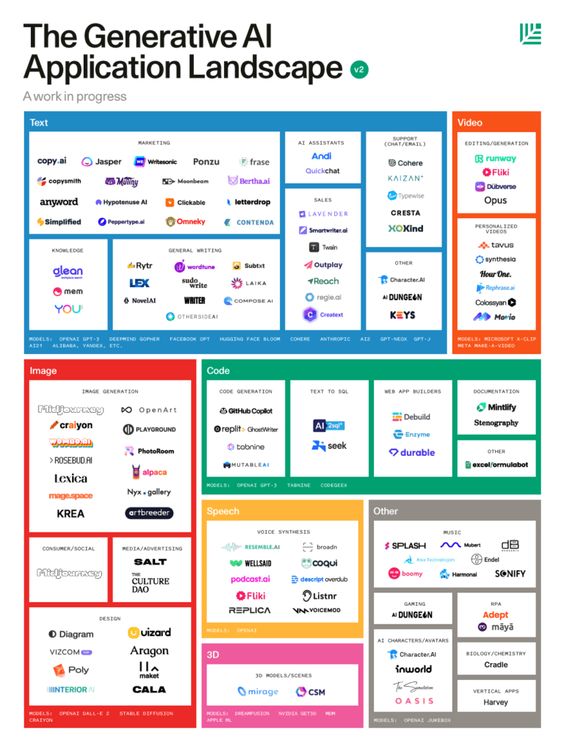How Generative AI Is Changing The Game For Marketers
Estimated reading time: 5 minutes
Generative artificial intelligence or generative AI is revolutionizing search, marketing, and content creation.
Visual or textual, generative AI models can produce unique and personalized content at scale, without sacrificing quality.
In this post, we will dig deeper into how AI technology is transforming marketing, its benefits, and how you can use generative AI to unleash productivity in business processes.
Reach out to us for a free consultation on our MarTech development services.
Table of contents
- What is Generative AI?
- How is Generative AI Changing the Marketing?
- What are some examples of generative AI tools?
- The Benefits of Using Generative AI for Marketers
- Challenges of Implementing Generative AI in Your Marketing Strategy
- Steps to Incorporate Generative AI into Your Marketing Strategy
- Key Takeaways
What is Generative AI?
Generative AI is a type of machine learning model that allows you to create content, media such as AI-generated art, or copies on their own, using a set of predefined rules or parameters.
With the help of generative AI systems, marketers can input their prompts or commands to generate the desired outputs. This is also termed prompt engineering or the input-specific instructions to produce unique outputs from an AI system or generative AI models.
How is Generative AI Changing the Marketing?
So, how are marketers perceiving the generative AI revolution?
Based on a survey done by HubSpot, here's how marketers are using various language models or AI models to offload their work.
- 85% of marketers find it beneficial to use generative AI to personalize their marketing content.
- 37% of users use it to create copy for websites and promotional mailings.
- 36% use it for generating new images and realistic images that are similar to human imagination.
- 35% use it to brainstorm ideas for their social media campaigns. For example, "5 social media post ideas for a brand selling sunglasses to Gen Z".
- 67% of marketers utilize large language models to create content more quickly.
- Further, generative models are also effective in creating product descriptions (reported by 60% of marketers), emails (43%), and social media posts (mentioned by 50% of marketers).
Hence, as a new era in generative AI dawns, marketers, and businesses are exposed to new capabilities beyond human intelligence.
What are some examples of generative AI tools?
Now that you know how marketers utilize these AI models to process business functions, here are some ai models you can get started with.


- Natural language processing text models: Lex, ChatGPT, Jasper, and AI-Writer are language models that can help you in generating content and high-quality text, or marketing copies.
- Video generation tools: Terra, Peech, Vochi
- Image-generation tools: Midjourney, Stable Diffusion, and Dall-E 2.
- Creating music: Amper, Dadabots, and MuseNet
- Coding: CodeStarter, Codex, GitHub Copilot, Tabnine, Debuild
- The voice synthesis tools: Descript, Listnr, and Podcast.ai
- Customer service chatbots: ChatSpot, Google Bard, ChatGPT, BingChat, Watson Assistant
- Google Search: Soon Google will introduce generative AI to search to facilitate faster search results and answers to complicated topics, uncover tips, and discover related products to your product query.
Read More: How To Use ChatGPT? - Tips To Getting Started
The Benefits of Using Generative AI for Marketers
- Companies can create high-quality, personalized content quickly and affordably by using generative AI. According to HubSpot, Generative AI saves marketers 3+ hours on a single piece of content. (Source)
- Generative models can be applied in various aspects of the marketing process, including content creation, market research, brainstorming, and branding.
- By using trends in customer and market data, Gen AI's sophisticated algorithms can segment and target the right audiences. By taking into account numerical data, these new models can help agencies to quickly analyze and pinpoint high-quality leads, resulting in more efficient, specialized lead-activation efforts. (Source)
Challenges of Implementing Generative AI in Your Marketing Strategy
While generative AI offers many benefits, its implementation also poses certain challenges for marketers.
Most notably, it can be challenging to create a unified and consistent brand voice that resonates with customers—particularly in industries where the tone of voice is essential.
Additionally, there is always the potential for errors, particularly if the system is not correctly set up or maintained.
Therefore, it is essential to take necessary measures to address such issues and ensure continued success.
Steps to Incorporate Generative AI into Your Marketing Strategy
Implementing generative AI into your marketing strategy can be a complex process, but it is worth it.
You can start by identifying the areas of your marketing processes that can be automated and strategizing accordingly.
Choose an experienced provider that will offer tailored AI algorithms that are specific to your business and your industry and emphasize extensive testing and training to ensure that your algorithms work correctly.
Moreover, constant monitoring and feedback of the system are critical to fine-tune your project and optimize results to obtain the best performance.
Key Takeaways
Generative AI is a game-changing technology that is revolutionizing marketing in many ways.
It enables businesses to create, personalize, and deliver high-quality content at scale while optimizing time and resources.
However, there are definite challenges, such as maintaining brand voice and ensuring the accuracy and time required for all processes.
Careful implementation is essential, choosing the right providers, training optimization, and measuring the results to perfect and fine-tune a project is crucial to get the best results.
Overall, generative AI is undoubtedly one of the most important technologies for businesses in the future and adopting it sooner rather than later can help companies stay ahead of the competition and provide better customer experiences.




